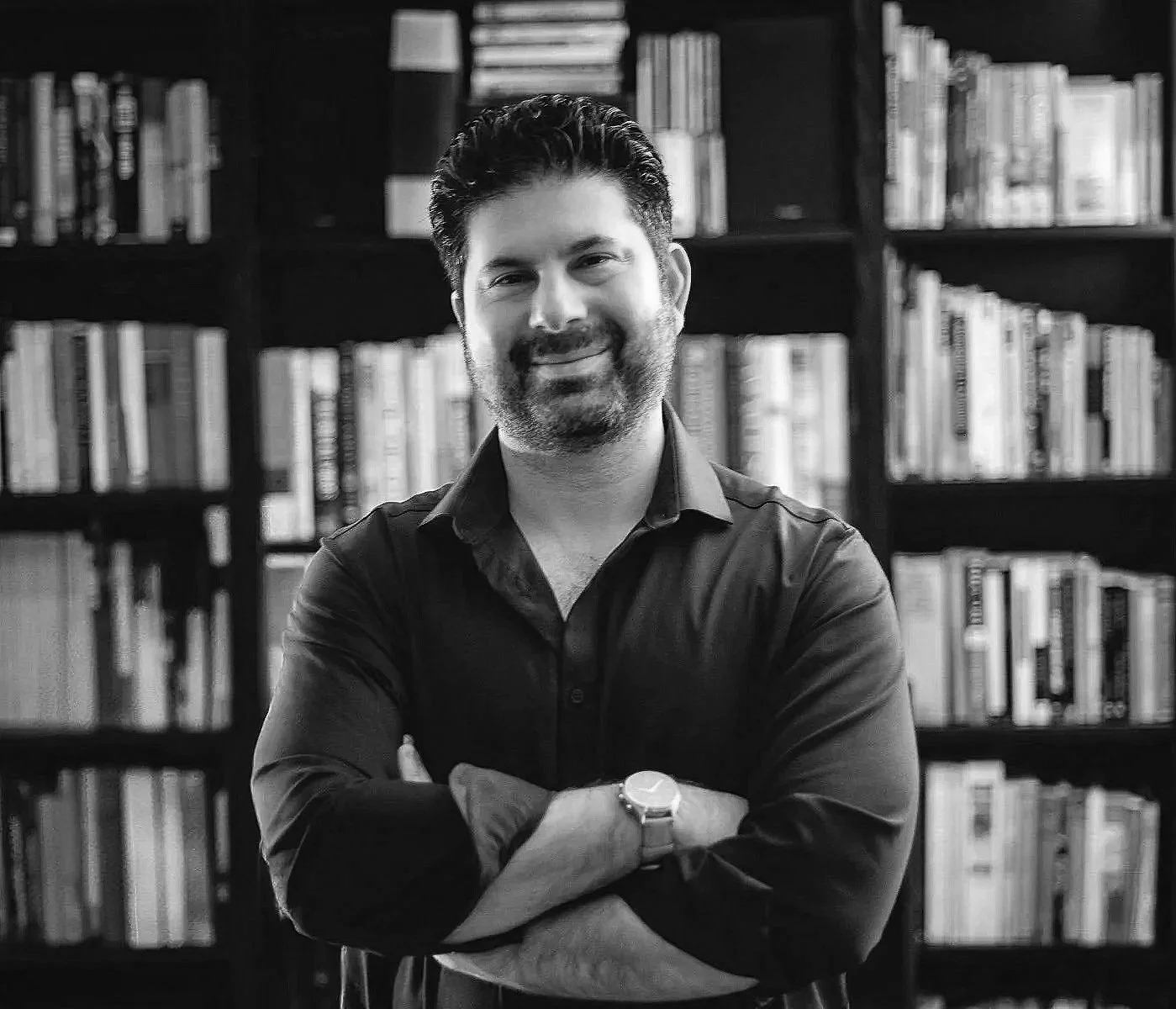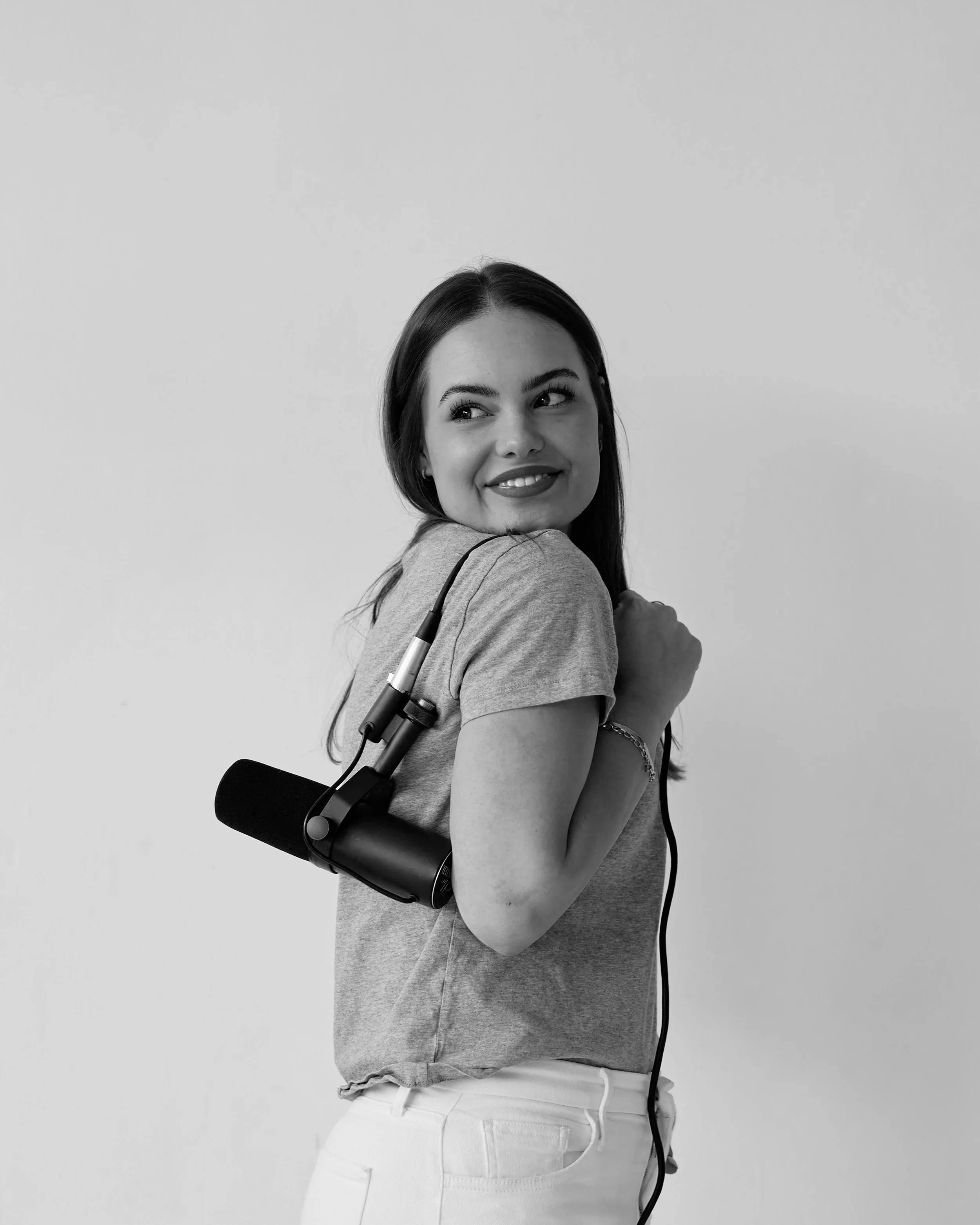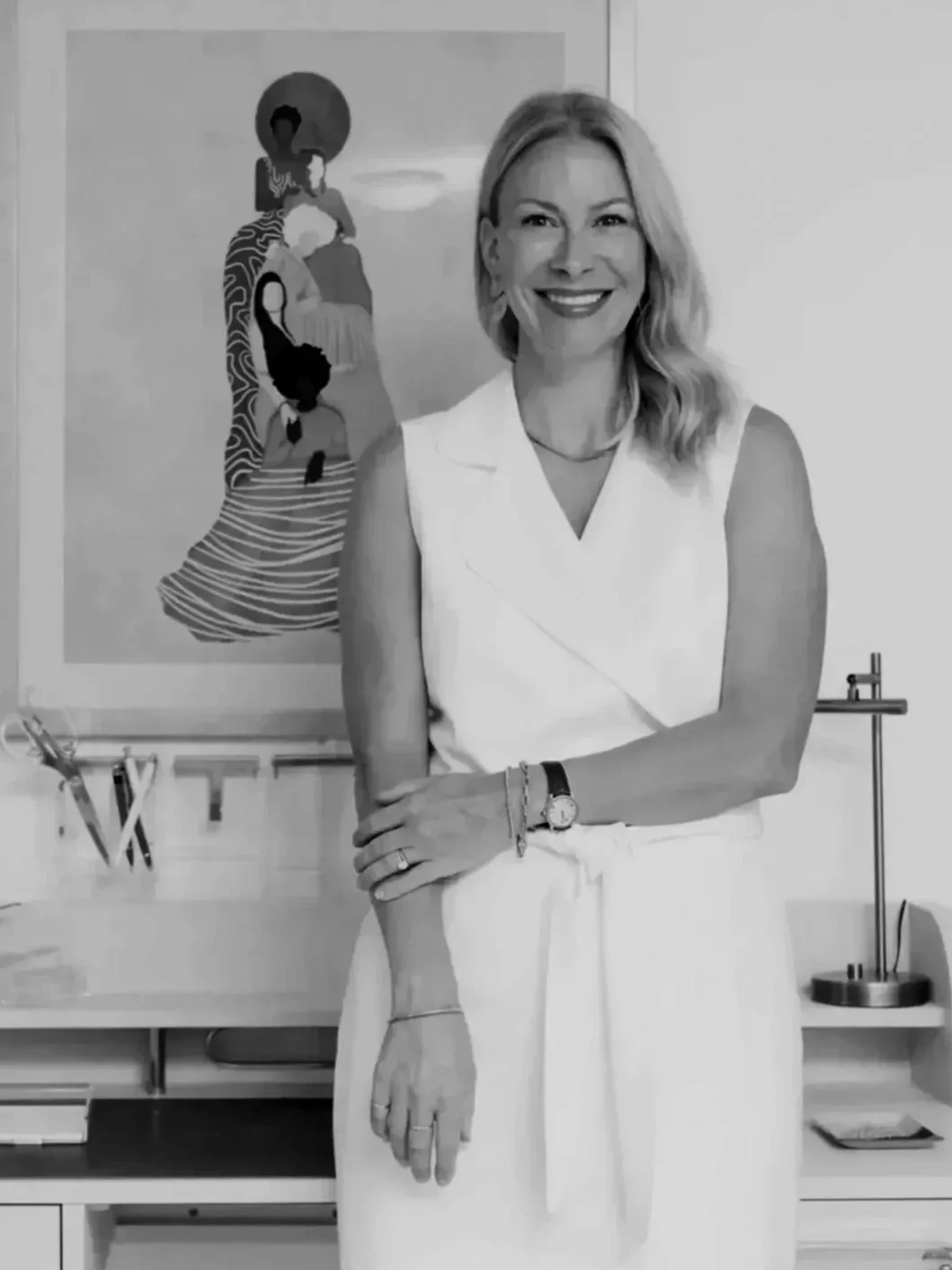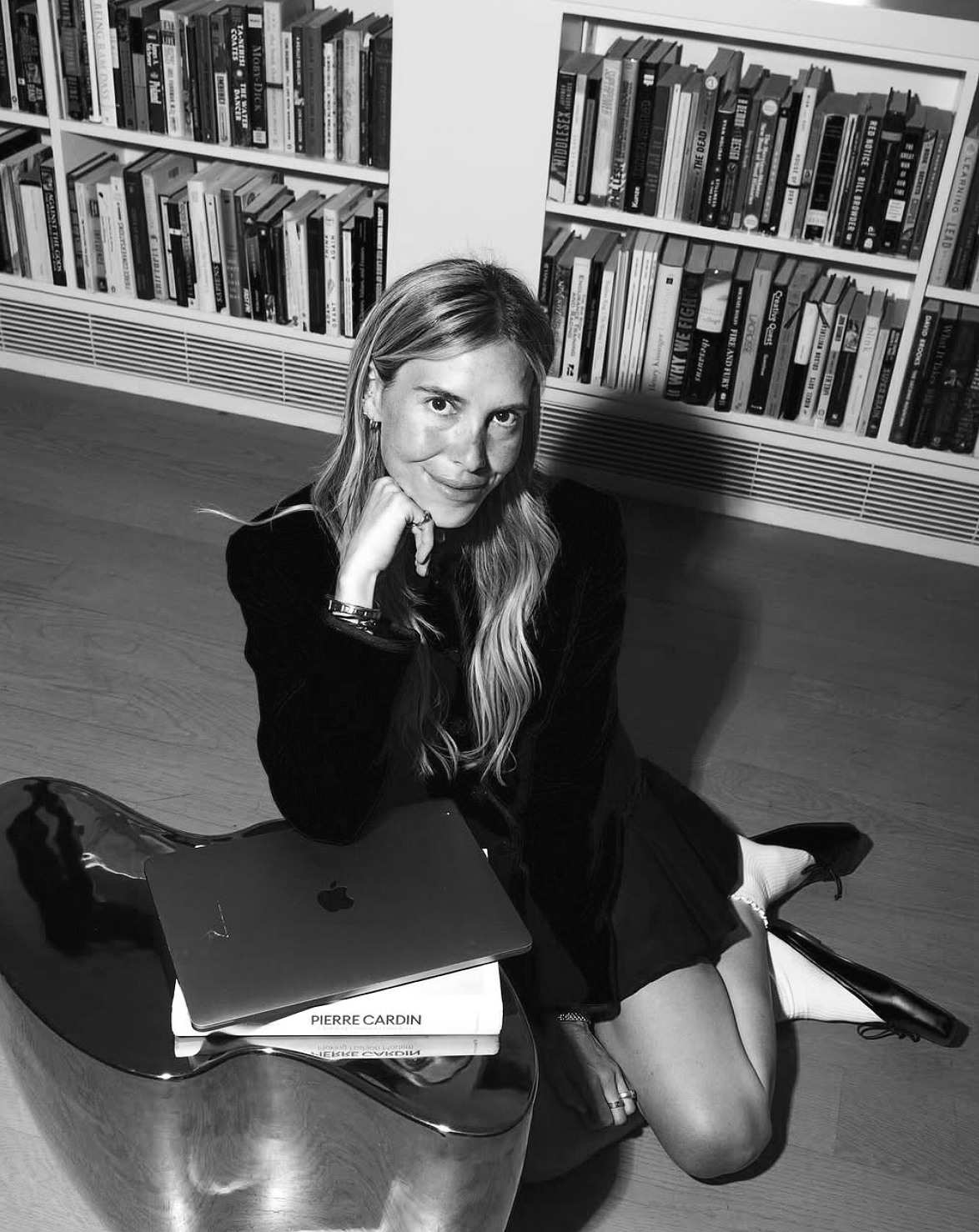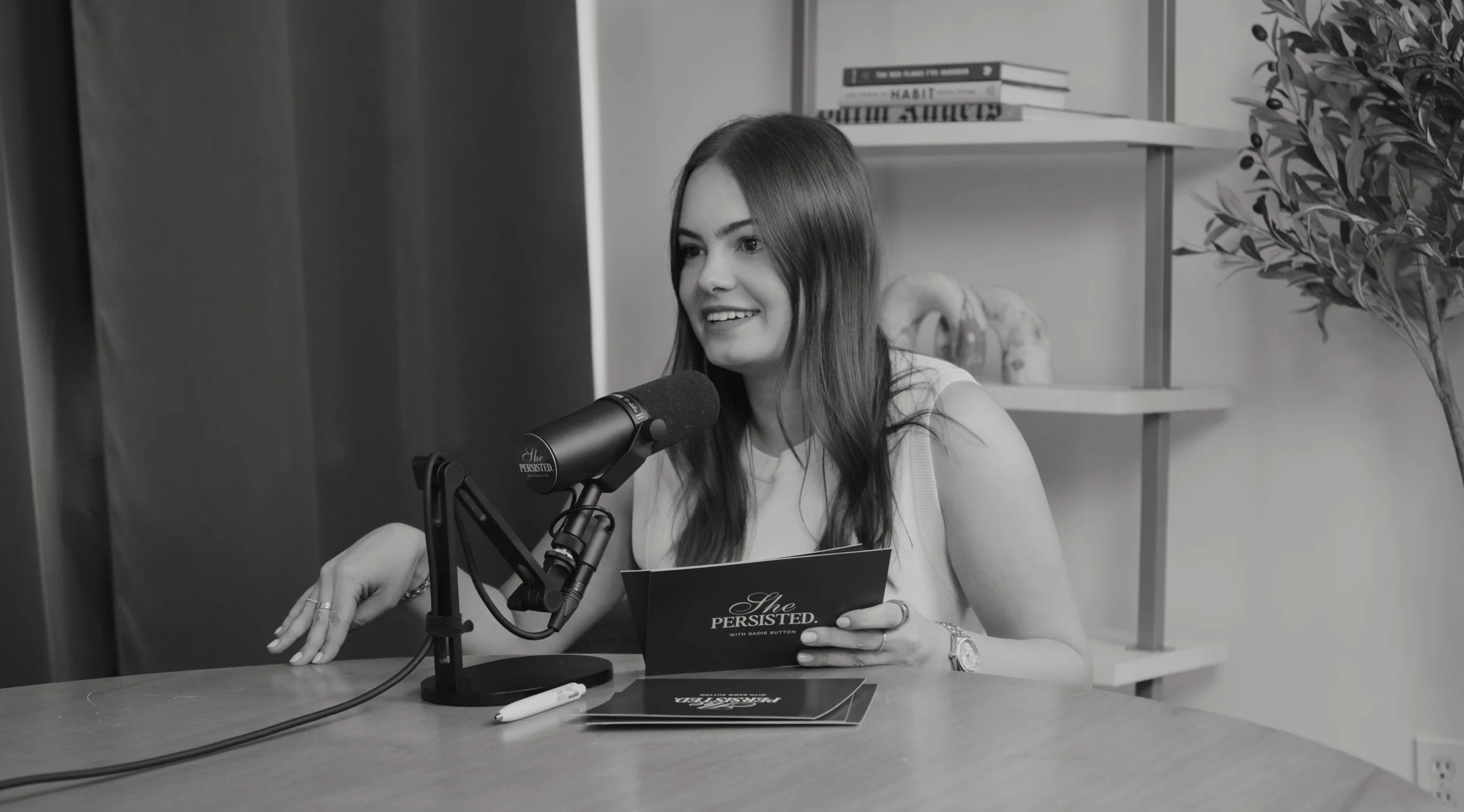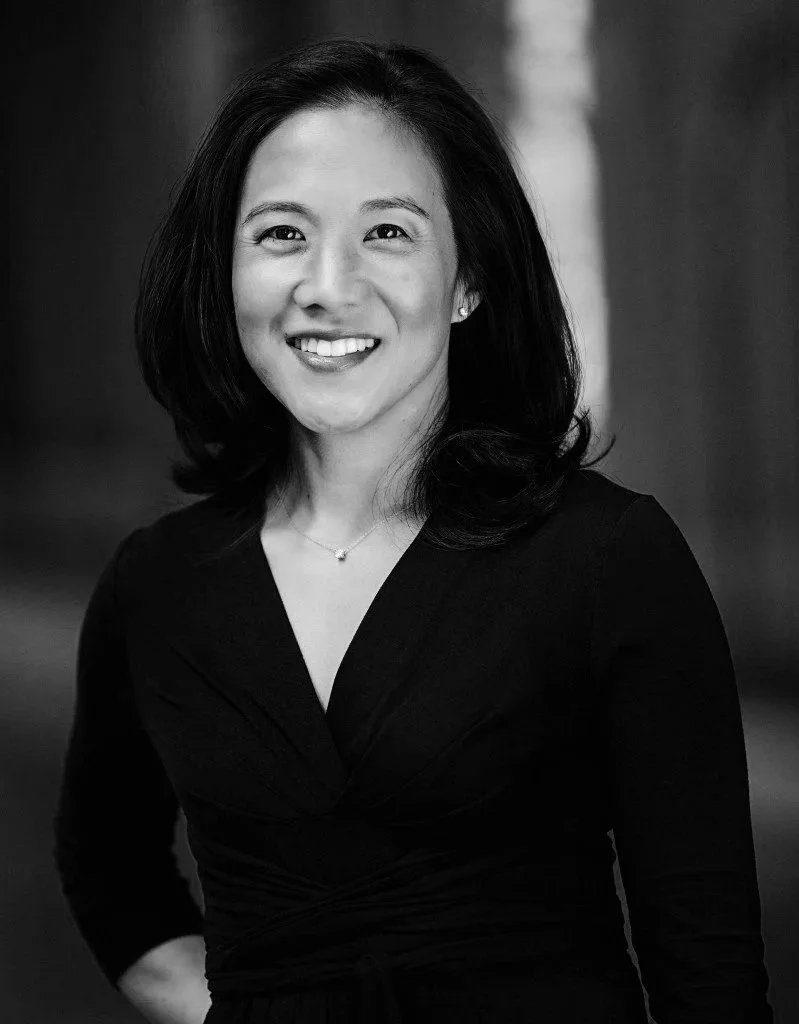229. why you’re struggling in college (& what to do) feat. dr. jessi gold
listen to this episode:
Tune in and subscribe on your favorite platform: Apple Podcasts | Spotify | YouTube | Amazon | GoodPods | Castbox | iHeart Radio | overcast | pocketcasts
oday’s guest is dr. jessi gold— a nationally recognized psychiatrist, writer, and speaker specializing in mental health care for students, faculty, healthcare professionals, and others in high-stress professions. she is the inaugural chief wellness officer for the university of tennessee system and an associate professor of psychiatry at the university of tennessee health science center.
in this episode, we break down what you need to know about managing your mental health as a college student. this episode has tons of information about the gen z college experience, including why your mental health might struggle in college and how you can ask for help if your mental health is suffering.
we talk about:
why college students aren’t asking for help with their mental health
areas that a lot of college students are struggling with
substance use in college + how that can affect mental health
challenges gen z uniquely faces today
what your grades might say about your mental well-being
a hot take about gen z + mental health
stigma around mental health that still exists for gen z
opening up to your family about mental health
difficulties around independently managing your health in college
things to figure out before graduating college
flaws in college mental health care to be aware of
AI as a form of therapy for college students
+ so much more!
Mentioned:
SHOP GUEST RECOMMENDATIONS: https://amzn.to/3A69GOC
About She Persisted
She Persisted is THE Gen Z mental health podcast. In each episode, Sadie brings you authentic, accessible, relatable conversations about every aspect of mental wellness. Expect evidence-based, Gen Z-approved resources, coping skills (lots of DBT), insights, and education in each piece of content you consume. She Persisted offers you a safe space to feel validated and understood in your struggle while encouraging you to take ownership of your journey and build your life worth living.
a note: this is an automated transcription so please ignore any accidental misspellings!
Sadie: [00:00:00] Welcome to She Persisted, the Gen Z Mental Health Podcast. I'm your host, Sadie Sutton. Let's get into it.
Dr. Gold: I think a lot of like just sort of the side effects of hard work in college or that you feel bad, like there's all this stuff that's like. , Kind of part of the culture of college where, you can kind of look around and go, I think that that just means I'm doing a good job or I'm just working hard enough and so it's fine.
And there's like a weird badge of honor of like not sleeping and not functioning super well. And you college students are pretty aware of the world and everything that's going on in the world.
You read the news a lot. Read social media a lot. And when you care a lot about the world, like your problems are not gonna register. But I think that those all compound to make it harder to ask for help.
Sadie: Whether you're a college student about to start college or have a loved one in college, you have come to the right place for an unfiltered look at mental health care in college. Hello. Hello and welcome back to She Persisted. happy back to school.
If you are here for this episode, it is the perfect time to give this a listen. There are so many people that have really incredible college [00:01:00] experiences, but we also have to normalize talking about the more challenging parts of college. And this is something you guys have heard me talk about before We've had Dr. Greg Walton on the podcast and he did a study with college students where the intervention was that he told students that college will be hard. It will be difficult, and it is normal. To struggle. and they found that people's incomes drastically improved.
When they were primed for the fact that college is gonna be hard, and if you're struggling, that's normal. Like most people struggle in college. And part of this intervention was hearing from other students about how they struggled and how they got through it. And it really improved how people perceived their experiences in college, how they normalized them, and then how they worked through them, which I think is really incredible and very much aligned with this week's episode.
so while it's important to talk about our mental health experiences in college, one of the biggest issues is that college students aren't really reaching out for help. One study showed that up to 75% of college students dealing with depression don't want to get So by talking about mental health in college, we can [00:02:00] normalize those ups and downs like we saw in Greg Walton's study.
And hopefully create more hope for those that are struggling and let them know that reaching out is not only just like a possibility and a resource out there, but normal and can be incredibly helpful in your journey. So this episode is going to walk you through why we struggle with our mental health in college, what puts us at risk for mental health challenges, and how you can reach out for help if you are a college student who's struggling.
If you're a student, I know you're gonna find this really helpful if you know someone's who's struggling or if you yourself is struggling.
If you're in high school, this episode isn't to give you like anxiety and nervous about college. It's a really great resource that you can be proactive once you get to college and you again like know what to expect and know that struggling with that transition is normal and that asking for help is a great thing to do in that stage of life.
then of course, parents loved one, teachers, family, friends, all the things. You guys will learn a lot from this episode as far as what your child is going through and how you can be more empathetic towards their experience and [00:03:00] be a resource that they can turn to for support So our guest today is perfectly positioned to speak on this topic. It is Dr. Jesse Gold. She's the chief. Wellness Officer for the University of Tennessee system and a psychiatrist at the University of Tennessee. So she has an up close day-to-day look at what mental health is like in college, what resources are available to you, and how you can thrive in this stage of life.
So without further ado, let's dive in.
Jesse, thank you so much for joining me today on She Persisted. I'm so excited to have you on the show. and I'm just so excited to dive into quite a hot topic, college and mental health, and give parents more insight into this phenomenon.
Give. Any therapists who are listening, additional nuance and insight for what their clients are talking about. And then of course, college students, some really actionable, tangible ways they can help improve their mental health set themselves up for success.
Dr. Gold: Thanks for having me. I'm excited too.
Sadie: I wanna talk about this idea of. Not being sick enough with mental [00:04:00] health because I think this is something that we tell ourselves a lot. It's a very common narrative that is on repeat in our own heads where it's like, well, maybe it's not perfect, but it could be worse, or it's not bad enough, and I'm really curious what your thoughts are on that phenomenon in the context of college mental health, because I wish we all approach this from like a, we can all improve our mental health, just like we can all improve our physical health and.
Working to better our mental health will only positively impact our relationships and our academics and our future career and our goals and just our day-to-day experiences. And so I really do wish we had that experience of like, okay, it's great that like it could be worse and at any point I can get resources and support and currently take steps to improve my mental health and not wait until I hit rock bottom.
But what are your thoughts on that kind of like. Language and verbiage and just internal narrative in college students that it's not bad enough or I'm not sick enough to need [00:05:00] support or help.
Dr. Gold: Yeah, I mean, I wish it was just college students too. I mean, I think we see it all across the board. I think in college it becomes more pronounced in part because I think a lot of like just sort of the side effects of hard work in college or that you feel bad, like you're tired, you don't sleep very much.
Sometimes you're sad. Your friends kind of look mad too. Your relationships are messy. You drink sometimes, like there's all this stuff that's like. , Kind of part of the culture of college where, you can kind of look around and go, I think that that just means I'm doing a good job or I'm just working hard enough and so it's fine.
And there's like a weird badge of honor of like not sleeping and not functioning super well. ,
Which, you know, has characteristically been there for a long time for, for college students or really anybody who's high achieving and, you know, in some capacity. , I think the not sick enough thing for mental health also comes from like, you can't see it.
You know, like I hear so often from healthcare workers, like the way that they decide if they are [00:06:00] sick enough to go to work is like, am I actively hemorrhaging? Like if I showed up at work right now? Is there blood coming out of everywhere so people would totally know I deserved it. Right. But if that's your barrier for like, do I skip work?
Do I skip class, do I whatever, do I deserve to go get help? mental health is never gonna meet that barrier because you're never gonna be like, I mean sure emotions, things like that are like actively hemorrhaging inside of you and externally, but it doesn't make. The same sort of like grade of what counts.
And so I think in our society, sort of like physical health, even the physical health reasons why we might need help or, or skip work or whatever are pretty high. So mental health has a really hard time registering on that, and we learn that in our household. You know, it's culturally based for sure. Like some people have higher barriers, depending on what it was like in their house to talk about mental health or what it's like in their culture if they're supposed to go to church instead, they're, you know, there's all sorts of things that might get in the way there.
But I think that. those all compound to make it harder to ask for help.
[00:07:00] And then, you know, , like mental health in general, if it's not really understood and you kind of look around and your only image of the people who need help or the ones you've seen on TV or something that need help are really, really sick or psychotic or something where it's like.
These intense things when you're like, I'm just sad 'cause school is making me sad. Or I'm sad because I had a breakup or something. It feels like it's not real or worth it or something.
And you, you like college students especially,
are pretty aware of the world and everything that's going on in the world.
You Read the news a lot. Read social media a lot. And when you care a lot about the world, like your problems are not gonna register.
Like they're not everybody has worse problems. it's a hundred percent true. Like I'm a psychiatrist, I hear the worst part of everybody's life. If I measured my problems against theirs always, I would never have valid problems.
and I think that that's what happens when you watch the news too. You go like, well, there's this going on here and there's this population having this happen, and there's this, and you're like. My best friend's, [00:08:00] mom is sick and, and you just start kind of going around the world and going like, well, news says this.
My social circle says that. my one friend got hospitalized. My, and you're like, and I'm just kind of sad, like, I don't think I deserve to get help for that. And really, like, that's not true. But it's easy to do that because you kind of always be comparing, right? Like you are comparing about everything in your life.
So like it's not surprising that you also kind of compare like. Do I deserve to get help or my problems, register on a radar? But like I always tell people, and I tell patients all the time, like. The worst problems are your problems. Like even if you're helping your friends, you're helping your, the worlds or whatever, like whatever you feel is valid and matters, it doesn't necessarily matter if the cause is as bad as someone else's cause you feel those things.
So like, feel them, take care of them, deal with whatever it needs. To happen with that and like see what happens.
Sadie: Yeah, So a lot [00:09:00] of people like have that mindset. It's not super effective. We have to kind of reframe. The standards we're holding ourselves to when it comes to when we deserve support or break or, , additional resources. I'm curious what you're seeing as far as what mental health challenges students are struggling with.
I know what I hear from peers, , and from my own personal experience, I think. A lot of sleep deprivation, which makes things only worse. I would say some people are struggling with boundaries and healthier habits. When it comes to substances, I would say there's a lot of anxiety, whether it's related to academics or just day-to-day life, grind culture, future careers, internships Also, I like to say college is optimize for avoidance, which if you struggle with anxiety, It's so easy to avoid these things that are making you anxious, and then the anxiety just grows and intensifies. I also hear a lot of depression. , A lot of people struggling with lack of motivation or getting through the day, showing up where they need [00:10:00] to, and then.
I would also say relationships and loneliness is another huge thing that we hear from college students as being a big source of stress in their lives. , And then I think especially with the anxiety thing as well, there's other layers of that, whether it's like perfectionism or just huge amounts of pressure, and high standards that we put on ourselves.
So I think across the board there's a lot of areas that college students are struggling with. But I'm really curious what you're hearing from being in this context in a really real way on a day-to-day basis, , and what those most common experiences are, where they're coming from, and whether it's something that people struggled with in high school and it's just intensified, or if it's like completely out of left field.
Dr. Gold: Both. I mean, a lot of what you're saying rings true. I mean, I think what people need to understand is that college has and will always be a time of transition and identity development, and both of those things are going to cause anxiety, stress, depression, all of the above, on top of that, biologically you [00:11:00] are predisposition to develop a lot of mental health conditions around that age.
Like it's just going to happen. So in the context of big transition, meaning moving away from home, having roommates for the first time, leaving your, your social support, even if you are a commuter, like the schooling is different, the expectations are different, like the the sort of temptations around relationships and.
Drugs and alcohol, et cetera, are different. And like experimentation is different. And that's kind of what I mean by identity development. Like who are you, but who are you in the context of your peer group in, , the context of your sexuality and the context of like what you want to be doing and where your boundaries are and how you, kind of like understand yourself in, in that sense.
And then again, yeah, like biologically your brain's like. , This is when bipolar comes, this is when schizophrenia comes, and you're sort of like putting all these risks and, and kind of, psychological risks on at yourself at the same time. So it's not surprising that we see a lot in college [00:12:00] students.
The only things I'd like. Really add to what you're talking about? I think it's not surprising that like anxiety and depression are the most common things I see. what I will say that I've seen that maybe is a little different would be, , like.
Substance use in terms of drinking has gone down. , That it's cooler to be sober, but people define sober as also California sober. So we've got a lot of marijuana use. , I think that there was a belief that because it became legal, it was. Healthy or good for you, but I don't know that anybody ever told anybody that.
Yeah, and that's kind of what was perceived. And , that makes it hard because I've seen people who, , get psychotic or have manic symptoms like, you know, don't sleep, don't function, like, do risky behaviors as a result of using, , like. Cannabis at higher concentrations than they would've when it was bought off the street a long time ago.
And edibles are usually more concentrated. And so I see that a lot. I've seen people dabble with mushrooms too, in the same way. Like, look, I am gonna make myself [00:13:00] feel better. cause there's evidence that you can use psilocybin, which is the active component in mushrooms to help with mental health.
And so people are like, I read it, I saw it, I heard it on Joe Rogan. And then they're. Like hallucinating for months because of it, you know? And so I think that I've seen that. I'm a psychiatrist, so those kind of things show up to me more than they would a therapist. , I, I think there's a lot of emotion regulation issues, meaning like, people go from zero to a hundred really, really quickly and don't know how to stop in between.
And so a lot of crisis, a lot of like. Give me a diagnosis, but it might just be feelings. And I think we do need to understand that like not every sadness is depression and like try to be able to cope with emotions without automatically assuming it needs a diagnosis and treatment right away. Like maybe you're just a human and you haven't felt big feelings and you're feeling big, feelings all of a sudden, and you need to know how to deal with that better.
And you mentioned like loneliness and social connection. I hear a lot from faculty and staff [00:14:00] that people have a hard time making friends. I think COVID made that worse. I think social media has made that worse, but. It, it's a really hard thing to teach, right? Like if I, if I had a group on campus called like making friends, no one would come.
They'd be like, this is like the stupidest thing you've ever suggested. And so the people who need the help or who don't wanna get out of their rooms are gonna stay in their rooms. And so. You know, it's a hard thing to help people get better at, but you can see that even in sort of like an increase in social anxiety or people not wanting to like go up to people and make new friends or you guys are terrified of the telephone, it's like the telephone was the worst invention.
I was telling so many
Sadie: people right before this to try and finalize my sublet. So I'm like, guys, you gotta do it. we gotta do some opposite action.
Dr. Gold: Right, and it's not gonna change. Like some of those things, like you're not gonna be able to text your doctor's offices and just make appointments.
You're not gonna be able to do interviews via text. Like as much as AI and things have changed, some stuff like there has to be an element of human connection in everything. And so I think [00:15:00] that we need to like find the balance. It's not to say that texting doesn't help with connection or that AI doesn't help you think through some stuff.
But I think we do need to find the balance. And it's hard to teach, right? I don't think that if I told you like, I'm gonna teach you to make phone calls, you'd be like, what am I five? Like it just, you would be like, this is a terrible idea.
Sadie: I just don't want to.
Dr. Gold: Yeah. Like, this is terrible. Yeah. And so, yeah, I mean, I think that a lot of those things, I think, you know, we have to figure out how to target the communications and the training and the help in the right way.
And I'm not sure that we have, because people in my roles are kind of counselor roles are kind of like, this is a thing that people need to work on, but I don't wanna be like saying weird stuff. So people just laugh at me. Yeah. Like, what's the way to fix this or help this? And I'm not sure that I know.
Sadie: We are recording this in a period of time where we've had some really fascinating data come out. One is that for the first time when we look at flourishing, and the flourishing data starts collection at 18, so It doesn't include teens, but we [00:16:00] are getting data from this college student age population, and we are seeing that contrary to what we've seen historically, young adults are struggling more, and so it's like.
Less happiness in early life, less happiness in midlife, and then an increase in happiness and flourishing later in life, retirement, et cetera. We're also seeing, like you just touched on there, a lot of positives with Gen Z. Like people are drinking less intensively than they were before, so there are positives that are happening within this demographic.
It's not all doom and gloom. It's not all bad. And so I'm really curious what your thoughts are there having been in this space. For a long enough period of time that you're kind of seeing some shifts and changes in these trends. What are your thoughts on like that in particular, this new emerging data, whether it's from the flourishing study or from research that Harvard's Graduate School of Education has done, showing that like perfectionism and mental health challenges and college students particularly is up.
Why that might be what has changed while you've been in this [00:17:00] role that is leading to these. Study saying like college students are really struggling in a way that they haven't necessarily been struggling in the past.
Dr. Gold: Yeah. It's so interesting because. people will say things like, high school students are so much more stressed out about college and stuff than ever before.
And I was like, I was miserable. Like I only wanted to go to like an Ivy League school. I didn't get in, I got wait listed to my first choice and then thought I was like the end of the world and had to figure that out. And like that's a sort of ridiculous thing looking back, but it's just what I thought and knew and believed.
And so sometimes when I think about like. Is it really that much worse? Because gee is like, I felt like it was miserable and maybe it was just my circle and not everyone's circle, and maybe it's just broadened. And that's part of it too. , People make the argument that like, you know, with more people applying to more places, it's harder to know like where you're going, all that kind of stuff.
And more people applying, can't get in in the right way, blah, blah, blah. Sure. [00:18:00] I guess some of that is true. , You know, I don't feel like when I look at my patients that the things that they talk about are any different than the things I would've said as a college student around perfectionism.
I think that the world is messy and maybe more in your face complicated than it would've been for me. Like when I was in college again, like I'm just gonna like date myself so you realize I'm not a hundred. But also realize that I'm like young, you know, ish. And so Facebook came. Out, like kind of right when I was getting into college and we could only have Facebook if you had certain schools as your EDU address.
And so like really early social media, like keep in mind I graduated college in oh nine, right? So a lot has changed very quickly with relation to that and how we connect with each other. Then add the pandemic, what whatnot. But if you think about it, it's like, would I have been worse if I was seeing everybody's.
Stuff all the time. Maybe would I have felt more stressed about college if people posted videos with them getting in to [00:19:00] everywhere? Yeah, because there's this thing when I was applying to med school called Student Doctor Network and people would like just write when they got acceptances and you kind of looked at it just 'cause you're trying to figure out timeline when it was released.
Oh, they like, yeah, broad Cafe.
Sadie: If you did this application cycle, like I every day was like, what's happening? What's the updates?
Dr. Gold: It's miserable. Like there's nothing good about that. You just feel terrible. You're like, well, they sent it. I didn't get it. Guess I'm not getting, you know, like, it doesn't feel good.
Right. And so if, if I, I think about like what would happen if that was magnified and would I just feel worse as a result? 'cause it was in my face all the time. I couldn't get away from it. I couldn't like. Stop the judgment and the sort of desire to be better because that's what I think I need to do. And I think that could be true.
And then if I thought, like if I just had to see stuff about the world all the time in alerts on my phone in my pocket, like I didn't have a smart, like we got app iPhones, maybe like sometime in college. Like I had a Blackberry, you know, and so also like you didn't have to see the news all the time you could get away [00:20:00] from some of that stuff and even if you cared about the world, you'd have to see it every five minutes. And so I do think that like I would never be a person to tell you social's the devil and to blame everything on social. I actually don't think that's true, and I think that that is like a oversimplification of the problem.
But on social. On that, you're getting like the news alert, like it's nothing. It's not all comparison and what you're posting for your friends. It's also like, what are you getting? What are you taking in that way? And there's a lot of challenging videos. There's a lot of challenging things going on in the world.
And if you care pretty deeply, it's really hard to get away. And I think I would've struggled with that a lot as a young person because I struggle with it now. And so I think that that would've contributed to having worse mental health. I think, you know, it's hard for me to understand like how we can't find joy in that context.
I think that, people who live through Vietnam and stuff would argue that they had a lot of uncertainty and dysfunction and they did okay. [00:21:00] And the question is, did they really do okay? or did they just not talk about it? 'cause that's different. Like sometimes when I give talks.
People say stuff like, what's wrong with this gen? Like what do we do to them? why are they so sensitive and what did we do? And I think that it's not that we did something, it's that you can't turn off when you don't actually think something's right. So if you know that you could have better work life balance, that school could be done better, that work could be done better.
You are gonna say like, why is it not like this is stupid and there is a desire in your generation, like specifically to fix things tomorrow and nothing fixes tomorrow. I work in academics and in healthcare, both are just the slowest moving things on the planet, right? But I get the desire and I don't judge anyone in your generation for being like.
Of course this is miserable. Like why are we doing it this way? No, I'm not sensitive. I just hate this and I know this is a problem and it's affecting my mental health and I'm gonna tell you that it is. Right. , I don't think that makes you [00:22:00] weak. I think that it is pretty cool, but I think that in the context of systems that take a really long time to change, it can be really discouraging.
And really hard to, to see problems all the time and, and not be able to change them or know that like maybe you could, but it'll take 30 years or something. Like,
Sadie: that's terrible. Yeah,
Dr. Gold: yeah. You
Sadie: know For sure. I wanna touch on something that you've done a lot of your work on, which is help seeking reasons people don't ask for help or aren't able to adequately get support, and I think this is one of the biggest things that people don't understand.
Especially after a college student has taken their life and we see like all these huge news stories and a lot of parents being like, we would've been there, we would've offered support. Like they didn't go to counseling, they didn't speak up, they didn't say things like, it's this really interesting narrative that occurs, , about why that person maybe didn't ask for help or say [00:23:00] that they were struggling with their mental health or expressed that they needed more resources.
And I don't think it's just that simple. And so I'd love to, to get your thoughts on, I guess first why people maybe don't seek help or don't advocate for resources or aren't like so overly vulnerable with like, I'm depressed, I'm anxious, this is exactly what's happening. And then we'll also talk about the systemic challenges, , where maybe they need help, but either the resources don't exist or they're not given adequate care, there's not enough resources, whatever the challenges are on that side.
So. Why aren't college students asking for help or advocating for support when they might need it?
Dr. Gold: Yeah, so I'll say a couple things. So from like an individual perspective, sometimes you don't know you need help. Like if you're measuring all things by, am I doing well at school? Like I was, yeah, I can do school till I'm like a disaster in the rest of my life.
Like I'll talk to college students and they'll be like, I'm doing great. And I'll be like, oh, okay. And they're like, my grades are [00:24:00] good. And I'm like, okay. what's the rest of your life look like? And they're like, well, I haven't left my room. The rest doesn't exist. Yeah, like, I don't, I don't sleep, I drink, I don't have a lot of friends.
And you're like, but you're great. Because grades are great, right? Like we can do grades and we can do work, kind of like robots. It's often the last thing to go. So if you're measuring one by that and two by like looking around at you and realizing sort of everyone looks bad and so you're, you're okay in the sea of bad.
that's problematic because then you're waiting for something to be really bad. Before you ask for help. And so we become really immune to like noticing our own emotions, noticing our own struggle, noticing changes, and only noticing when things are really bad. And I'm, guilty of that too, but I would say that's one reason it's hard to ask for help until it's pretty late to ask for help because we aren't paying attention until it's like that two stigma.
As much as people would love to say, your generation is like so open and talks about mental health all the time. Talking is different than help seeking. So [00:25:00] I think that there's more language. I think that there's more, , okay talking about therapy a bit, but I do think that, especially in certain groups and subcultures, but also just kind of in general, like just saying words and being okay with saying words.
Makes you feel like in a way you don't actually need to go to the expert for that or that, like that's not part of the next step. The point of normalizing mental health is we get more comfortable, but we still then go talk to the people who know what they're doing. Yeah. And that part I think is still missing.
Sadie: And I think you're right there where it's like when you speak about your mental health challenges, you mentally are like, okay, like I've been vulnerable. I've told someone, I've taken a step, and it's like. No, you need to take the step with the professionals like, yes, it's so great that you've put words to this.
Yes, it's so great that you've communicated to someone, and we need to step towards resources.
Dr. Gold: Yeah, and if you're the friend or the coach or the faculty member, you're actually not trained to hold that. So it's actually [00:26:00] become more complicated in college settings to like make sure that people are getting adequate support, because if you think you got adequate support by telling your coach who has never had a day of mental health education in their life, that's terrifying.
And also a lot to put on your coach if you're the friend. Peer support's great. It's a really important part of life and it's a really important part of prevention, but. Your friends can only do so much and hold so much, and before it even starts to impact their mental health. Right? And so that's important too.
And so like, yes, talking about it is wonderful, but if you're talking about it and it makes you think that like something's not right or you don't like how you're feeling or you wonder how you're feeling, the next step, which doesn't always happen because we think that we solved it by like being aware and that's.
a hundred percent true. I also think like especially with meds, there's more of stigma and fear around it, and that's logical. I think there's just like not a lot of talking about meds as much as there is talking about therapy and we have a long way to go and destigmatizing psychiatry [00:27:00] and I'm happy to be one of those people.
But yeah, we have a long way to go and destigmatizing psychiatry and like that's part of it too. , You know, I think it culturally, like if you look around and your peers don't talk about it and it. Like maybe they're getting help, but they don't say they are. That also makes it harder too. So like if you talk about the words, but nobody said like, I have to go to my appointment, which I do every week, which is this time and this time.
Then you sort of go like. Whatever. Or if only a subgroup of people are talking about it, then you kind of put it on them. Like I've had patients say like, meds are for girls. And I'm like, what does that even mean? And they're like, well, all of our girlfriends take meds. And I'm like, okay. But is it just that your girlfriends are like talking about, like if I give you meds, I didn't make you a female. Right? I didn't all of a sudden like feminize you, but it's like, what kind of gets passed around, right? You go, well, that's for, that's for our girlfriends. that's not for us. And you're like, okay, dude. Like whatcha talking about, let's try to, let's work on that.
Right? And so like, it does, it is what you see, right? you internalize that and like if that's what you think, you're [00:28:00] not gonna go do that. Or if you think that athletes don't get help or you think that. Smart kids don't get help, whatever it is, right? Like you put these sort of labels on it based on what you see in here, like that also can lead to you thinking, well, I don't wanna be X so I'm not gonna do Y and I'm just gonna stay over here sad.
And, and that's part of it too. so that's like cultural individual reasons. Obviously is a big thing too. I think that as far as your generation has come and talking about this stuff, often they're terrified of what their parents think.
Sadie: .
And it's also, I've had a lot, it's also challenging because you're interacting with your family so much more, and so the pressure of bringing that up and being like, this is like one of the first vulnerable conversations we've had, and you're like, okay, and you don't have any insight into what my life looks like, but actually it's going horribly.
It's really a challenging thing to bring up.
Dr. Gold: Yeah, like you maybe even are a person who talks to your parents a lot, but it just like, when does it come up? Like when do you wanna say actually I'm not having a good time. 'cause you don't want them to come get you and you don't wanna admit that you need them.
Like there's all [00:29:00] sorts of things that happen with being an adult but not an adult and sort of transitioning and sort of not like, you don't wanna say help. Because then they'll think they need to come swoop you up in like a kid way. And that's not what you want, but you want the support. You want them to know you're taking care of it, but you don't wanna freak them out either.
And I think when you're away from home, sometimes when you say words like depression, it can scare people. And you don't want that to be the case where then your parents call you twenty four seven because they're concerned. And so I think that balance is really hard. I think some people's parents like definitely don't.
Believe in mental health I don't really know. That's such a weird thing to say to me. It's not like it's Santa Claus or something. Yeah, yeah. But I have patients who like, you know, 'cause if you get meds it might like bounce to your parents' insurance 'cause you're on your parents' insurance.
That'll be like, can I pay cash for that? how does that work where it doesn't show up? Can you gimme a different bottle than the label? I'm gonna rip the label off. Like all sorts of stuff like that that comes up, especially around meds. That wouldn't otherwise. And I, and I think maybe that would surprise people that that's the case, but there is a [00:30:00] pretty big generational difference in fear of what your parents will think.
You know? I think some of that comes from the parent generation not being open about their own struggles and, and stuff because they weren't able to, or they didn't know what to say. And so they're not saying like, dude, I would, I take meds. Like, you can take meds, but they should, you know?
Sadie: Yeah. I also think there's something to be said too, where it's like, in many respects, you are living your own life.
Like you are the one that's deciding all these aspects of your mental health. Like what time do you wake up in the morning? Are you having regular meals? Do you see your friends? Are you balancing your course load? Like all of those things you are doing completely independently. And like you're saying, there's that one piece that you're still very much tied to your parents.
And so really choosing to be independent and have agency overtaking that step. Is still something that's like a bit disrupted in that stage of life. And it can be very challenging.
Dr. Gold: Yeah. And nobody had you do it before. Yeah. Like you didn't make your doctor's appointments like you, if you took meds, like you mentioned, if they were taking them in high school, a lot of my patients go off meds because [00:31:00] they don't know how to make refills.
Because their parents always made their refills, right? Like, yeah, then I have to go look at the bottle. It says a number, call that number. Here's the thing. 'cause they like actually never did it. when they needed meds, they showed up on their counter and there were meds. And so they come to school, they like think it's gonna show up again.
It doesn't show up. 'cause they needed to order them or they needed to go to the doctor. And then they feel fine and they're okay and they don't need it. And then something happens and they do need it. And so a lot of folks who come in on meds. Like have a period where they go off and it gets worse. That happens a lot because they're like, I don't need help.
Like I feel great. my parents were wrong, whatever. Right. And that's a part of like understanding how to manage your own health. And that happens a lot. Mental health or regular health, like physical health. , But I think it's, worth the conversation to say like, if you're transitioning, like we talked about, how this is a time where folks are like looking at colleges or getting ready to go to their college.
Like if you are ready, take meds. figure out, figure out how to get meds and figure out [00:32:00] like how to set up appointments. Because if you've been taking them for a while, there's no way that even though there's a happiness of a transition to college, that that stress is not gonna be stress. Like, yes, transitions are transitions.
No matter what they are. Graduation's a transition too, right? Yeah. Like I'll have patients who are seniors be like, I'd like to go off meds. And I'm like, let's talk about it because you feel good now. Yeah, right. But like, have you worked in a job before? Are you sure this is the best time? Do you wanna wait?
And there's no Perfect time, right? Because like start a new job. Is that the time? How long do you have to be at your job until you're good, right? Like it's all kind of made up. Yeah. But you have to ask yourself that stuff.
Sadie: And like you mentioned, this is the perfect time to kind of figure out some of those challenges because like logistically, your therapist might not be able to see you where you're at college, you might need a new psychiatrist.
Your prescriptions might be filled if they're called in from out of state. And so very real things to figure out so it's not another stressor and challenge that's on your plate.
Dr. Gold: Totally. Same with graduation, like you had built in [00:33:00] care in your campus. Now you have to find someone not at campus and like that is important to know, and it can take a while.
It's terrible. We talked about other barriers, access. Terrible barrier. it's really hard to get care and get care with someone you like. And so when you find one, it's frustrating to move and not be able to have that person anymore or you know, whatever that looks like. And so it is important that you like, think about that when you're moving to college or from college or any other stage of life to be able to say like.
Oh, okay. This is complicated. Even summer, you might not be able to see the same people because they might not be licensed wherever you are living for the summer. , So that can be kind of complicated. If you take stimulants for a DHD, that's a really important thing to figure out because sometimes, you can't prescribe those like regularly across state lines, so you'll need somebody in where you move, even if your doctor's cool with it.
So just like, you know, adulting 1 0 1 and kind of is so frustrating that it's a problem, but it is. Yeah, like. [00:34:00] Really important that that doesn't get dropped off in the, yay I'm moving. Or like, yay, I am starting college transition because it will go very quickly from yay to I'm now turning in nothing 'cause I don't have stimulants and I can't focus, or I'm sad 'cause I used to take antidepressants or I'm anxious 'cause I used to take antidepressants and you need to, to manage that stuff yourself.
Sadie: okay, So you mentioned one barrier, which is not finding like a right fit or it's really challenging to find good care.
What are these other systemic challenges, especially in the college context where people get to the point where they're like, need help, I want help. I'm help seeking, which is. Such a great point to be at. And maybe they don't receive the help that they need or they deserve, or that we wish they could have access to If they're struggling with their mental health and they get to the point where they're looking for that level of support externally at college, like what is the disconnects that can happen there?
What do you wanna see change in those systems?
Dr. Gold: So colleges are often short term models. [00:35:00] That means that if you're a person who needs to go weekly every week for college, you cannot go to the college counseling center. you would need to spread it out to like, it depends on what college, it depends where you are, but it's often like six or eight times.
Like it's mostly monthly is the most you can do, but often it's about every six weeks or, or two months even depending, like they give you this many sessions a year kind of thing. That's just because of capacity, like. As a person who understands systems, it's less frustrating to me now to recognize that short term is not something the therapist really wants.
It's like if they saw everybody every week, they're, they'd be closed by the first week of college because they couldn't see new patients. And so that's where that's coming from. It's the model to be able to see the most people with the shortest wait time. And it's not a great model for like continuity of care or long-term care.
But it is good if you need someone quickly or you don't need somebody all the time. If you're a [00:36:00] person who's coming in and you've seen someone very regularly, don't even bother going to college counseling. Like just find somebody in the community. Okay. The thing that stinks about that is often like that's more expensive because college counseling tends to be covered in some capacity for a certain number of sessions where it's free.
So that option isn't always available to people. But if you're, like, if you have trauma and you wanna work through trauma, if you have like a complicated history, like you're not gonna like going to a short term therapist. . Wait lists, I think can frustrate people a lot in colleges. And so I think that people get really frustrated with wait times and they get really frustrated with like, maybe they got me in once, but then there's a wait time. So I would just say. It's not usually that your college counseling center is terrible, it's that they're doing the best they can and you might need to go off campus at that time and that.
S frustrating, but you might get seen quicker and that might be what you want. , There are times of the year that like, that's worse, you know, around finals for sure. And things like that. For sure. You can see it peak [00:37:00] and you can see it go back down and, and summer's better. Like all of that is true, but just things to be aware of that like it's set up to help you with like smaller problems, shorter problems, more acute problems, I suppose, but not necessarily like long-term needs.
Or to be a perfect place for you to be seen at 5:00 PM every Wednesday. Like, it's not set up like that. So if you're like, I don't wanna go to therapy at 8:00 AM well, you might have to wait a while because they might have all of their fours or fives or whatever filled pretty early. 'cause they're the desired times, you know?
And so just being mindful of that I think is, is important. I would say the same for like sort of diversity of access and you're seeing so. You know, some college campuses have access to telehealth companies for that reason, for like shortening wait times and making it more accessible, but also sort of like diversifying who you're able to see.
Because if like I hire three therapists to Memphis, Tennessee, the chances that [00:38:00] those. Three therapists look like Memphis, Tennessee are very small. You know, I think it's hard to recruit to certain places in the country. College counselors are paid way less than they would be paid in private practice.
And so like, you don't get access to sort of a diverse representation of the human experience. . And the things that people want. 'cause people often want therapists that look like them and have backgrounds like them, which is a plus or minus. You can, you can kind of argue back and forth. I think that some people can do a good job and not look like you, but I understand the desire.
And so I think that that, like on a campus, you might need to go to an app or you might need to look in a community for something like that too, because you might be like, I want a. Young therapist of color that might have to be a, an app that might have to be a community search.
And that might not happen like in a, sort of order, like an order form of perfect, you know For sure.
Sadie: I am curious your thoughts on AI as therapy because
we're seeing interesting data from Dartmouth that AI [00:39:00] can be more effective than a therapist for some things. What are your thoughts on college students who already are struggling to seek support? Maybe there's barriers And chat, GBT or whatever model they're using is so accessible and is right there and you're not dealing with a wait list, you're not dealing with. Not being able to see them every single week. I do think that even though we're already seeing people turn towards this as a mental health resources, something that we'll continue to see and that will increase as a psychiatrist, as someone working in college mental health, what are your thoughts and and reactions to that trend that's occurring real time?
Dr. Gold: , I mean, I am a person who will always tell you increasing access is important. I feel similarly about telehealth. Mm-hmm. I think we, in certain populations, we absolutely need it, given all of the choice in the world, especially even for my own therapy, I prefer to go in person.
Did telehealth make it easier for more people to have access? All over the country who wouldn't have otherwise? A hundred percent. Is [00:40:00] that important? A hundred percent. Do I still think that there is something to being in the room with someone that is different than being even virtually with a human?
Yeah. Yes. So do I think that a human versus a not human has difference? A hundred percent. Is it a thing that somebody could do in the interim and it could tide you over? Sure. Does it help? If you know the limitations of that and you know when you are supposed to then go from that to actual help. Okay? If the thing can triage you and tell you you're too sick to talk to it, and you get to actual help at the right time, that's also okay.
I worry a lot about people turning to the wrong things for their wrong degree of severity because when you're sad, like you don't need to know that. I need to know that. Yeah. I need to be able to tell you where to go. You're sad. Just be sad. And I don't know that an AI thing is like really designed to screen you and triage you.
Like there are some, like, robot was made for that purpose you know, some, some [00:41:00] schools use some of that to triage people to the right resources it again is an expander of human. But if you, Think that you don't have to do those other things ever because of the, the different thing. I think that's a problem.
I also just like really worry that you guys will not be able to talk to people. Yeah. Like I just have a lot of concern about that because like you text, you email, you don't write letters you don't like. There is no need to have an interaction. Does AI save you time? Sure. Is there maybe evidence that, like some of what they tell you to do skills wise and support wise and the way they validate you might be exactly the same as the way I could?
Sure. But do you learn something like talking to a human being that you don't learn talking to a fake human being? I hope so. Yeah. And I just have concern that like, you will not be able to exist in the world if all of your relationships are virtual and like I. Hear where the evidence on that stuff is coming from.
And they mean well, like they [00:42:00] are inherently coming from a place of extending services when you can't have access to me and a lot of people don't. And I get that at its core. But I have like in a perfect world, have a lot of concerns that we are just not gonna have people who can talk to people as a result.
Yeah.
Sadie: Yeah. I agree with lot of what you're saying. I do think we're drastically going to see mental health care shift, especially from a pre preventative perspective over the next 20 years utilizing ai. I think we're talking about with triaging, incredibly effective, has a lot of potential skills-based interventions.
Validation when it's not in like a, a critical context, whether it comes to habit tracking or things like the, OR ring, like these ways that we can. Improve these day to day, not as trauma based, relationship based, but things that are good for our mental health. I think there's so much potential there, especially with the fact that we don't have enough clinicians.
You could say to chat GBT, like you were [00:43:00] saying, you are a therapist from a minority background speaking X language informed with this type of care, like respond in this way. , Or what would you say to this question? So I think there's a lot of potential for innovation and I think what you're saying is so important about.
Where it's currently lacking and where real life clinicians fill that need. And at what point getting real care and getting support from actual resources is a step that needs to be taken.
Dr. Gold: Yeah. And I don't know that most people would know to feed it the right prompts.
Sadie: Yeah. I will put out there like I struggle with that too.
And also the ethical concerns of like if I pus these on TikTok and be like. T, you're a DB T trained therapist. This is the skills you're using. Tell me what to do in this situation or use this model of pros and cons from DBT. Walk me through this ethical and moral implications of like posting these things that people could prompt.
Would they get better results that are back to evidence? Yeah, but [00:44:00] also who's asking the prompts and in what context? So it's really challenging.
Dr. Gold: Yeah. I mean I really hope that like it's one of those things that gets kind of integrated into the continuum of care. Yes. And that like let's say I had a person seeing me, but they could only see me once a month.
Yeah. Maybe I would say in between our visits. Make sure you work with ai, whoever to track your sleep. Yeah. And track your mood. And track. Right. Like if there were clear like ways where you're kind of finding out how it fills the holes and also supports people and like the right people get to the right care.
I think it matters if they're like these situations where people fall, fall in love with the AI or, or like die by suicide as a result of the ai. Yeah. Like, we're not there yet and we have to have those designs in place. And I worry sometimes when I talk to companies that do this stuff, that they're not thinking about safety as much as they should and screening as much as they should.
And you're kind of like, but like, what if, do you, are they just signing a waiver by like, turning it on? Right. and I think we might [00:45:00] be, right. Mm-hmm. Like, and. I'd like to hope I'm not replaceable by a machine.
I'd like to hope that I shouldn't be scared of them either, and I should try to find ways to integrate it into my practice, but I'd like to hope that like me as a tool is different than some medical specialties as a tool and that I will still have a job, but I don't know.
Sadie: Yeah, absolutely. Well, if people want to read your book, Utilize you, as a resource, reading your articles, consuming your content when it comes to college mental health, where can they do that?
Dr. Gold: Sure. So I'm at Dr. Jesse Gold on most platforms. Jesse spelled like Jessica without the ca, so J-E-S-S-I. , Dr jesse gold.com is where like all my writing is, like where you can find stuff about me coming to speak and stuff like that.
Trying to speak more on college campuses too, if that's of interest. And then my book is called How Do You. Feel, , it talks a lot about my college experience. One of the patients that it follows is also a pre-med. So you kind of can see the life cycle in perfectionism and healthcare and all the challenges we have caring for ourselves as we care for other people.
It's part [00:46:00] memoir, that's available wherever you get books, I think at, at your particular institution.
You can request it if you don't have it elsewhere.
So hopefully people like that and can tell me if they do.
Sadie: Amazing. Well, thank you so much for joining me. I'm so glad we got to have this conversation and I know it will help so many people.
Dr. Gold: Thanks for having me.
If you enjoyed this episode of She Persisted, make sure to leave a review, subscribe, and share with a friend or family member. Follow along at at She Persisted podcast on TikTok, Instagram, YouTube and more for bonus content. Thanks for listening and keep persisting.
© 2020 She Persisted LLC. This podcast is copyrighted subject matter owned by She Persisted LLC and She Persisted LLC reserves all rights in and to the podcast. Any use without She Persisted LLC’s express prior written consent is prohibited.






